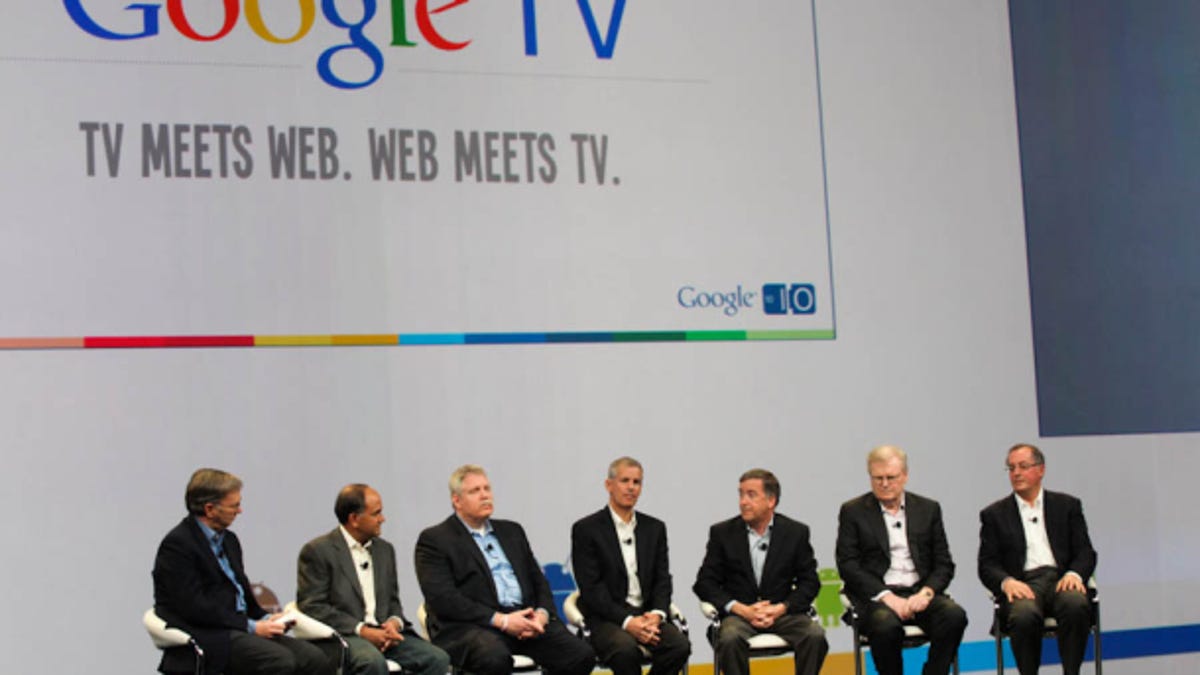Week in review: Google changes the channel
With the introduction of Google TV, the search-giant-plus appears to have disrupted yet another market sector. Also, media companies tackle privacy issues.

Google, the search giant and so much more, this week appears to have disrupted yet another market sector with itsintroduction Thursday of Google TV, an Android adaptation that puts regular television and the Web in one user interface.
The announcement stole the show on day two of the Google I/O developer conference during a keynote speech that focused heavily on upgrades to Google's Android smartphone operating system.
With a panel of some of the most important CEOs in the world of consumer electronics (Sony, Best Buy, and Intel, among others), Google declared its intention to, "do what the PC and consumer electronics industries have tried--and failed--to do for years: bring the nearly unlimited content of the Web to the large-screen TV while preserving the tried-and-true television experience that has enraptured three generations of Americans," as CNET's Tom Krazit put it.
Google TV is a technology that will be built into TVs, set-top boxes, Blu-ray players, and other devices that will allow people to do things like use Google Search to find videos from the Web and whoever your channel service provider is, as well as watch full-screen YouTube videos, find shows on Hulu, buy TV shows on Amazon on Demand, among others.
The first partners include Sony, Dish Network, and Logitech. All of them plan to have their first Google TV-based products in stores by fall. Best Buy is going to be the first retailer to sell them.
Also Thursday, the company revealed features for Android 2.2, aka Froyo, with speed and better performance topping the list. Froyo's Dalvik virtual machine, the foundation that actually runs Android applications, includes new technology that runs software two to five times faster for heavy-duty applications, said Vic Gundotra, Google's vice president of engineering, at the Google I/O conference.
On day one of I/O Wednesday, Google continued its pitch for the enterprise, attempting to make the case that businesses should be considering Web-based technologies for their own applications--not just Google's.
• 7 unanswered questions about Google TV
• Google previews Chrome OS usage with Web Store
• Google tries freeing Web video with WebM
More headlines
Google faces probes and lawsuit over Wi-Fi spying
The company is being investigated by European authorities and is the target of at least one U.S. lawsuit after admitting it had spied on some Internet users.• Google's Brin on Wi-Fi spying: 'We screwed up'
• FTC asked to probe Street View privacy snafu
• U.K. officials ask Google to delete Wi-Fi data
FAQ: Deleting yourFacebook account
Facebook's ever-changing privacy practices and adherence to opt-out methods are prompting some to consider deleting their accounts. But how is that done and what does it mean?• Facebook sent some user data to advertisers
• Apps emerge to reset Facebook privacy settings
• MySpace promises users simpler privacy settings
FTC approves Google-AdMob deal
In what came as a bit of a surprise, the FTC will not stand in the way of Google's purchase of mobile-ad company AdMob, saying the deal would not harm competition.• Google to take on iTunes with Simplify Media buy
Microsoft's new Hotmail takes aim at Google
Redmond is hoping a major update will improve Hotmail's image and allow the free Web mail service to be considered a serious rival to Gmail.• Microsoft working on Hotmail's iPad issue
Microsoft sues Salesforce.com over patents
In a suit filed Tuesday, software maker says online CRM company infringes on nine of Redmond's patents. Microsoft is seeking monetary damages and an injunction.HP: WebOS headed to Internet-connected printers
On earnings conference call Tuesday, CEO Mark Hurd talks form factors on which he expects to see the OS from newly-acquired Palm.• HP quarterly revenue up 13 percent to $30.8 billion
• HP won Palm in six-company bidding war
Utility industry grapples with smart-grid tech
In a survey, utility industry executives say they want certainty over regulations and are struggling with how best to invest in new technologies.• Study: Smart meters need better user interface
Results of cell phone cancer study inconclusive
The study by the World Health Organization studied 13,000 people over 10 years on a possible link between cell phone use and two types of brain cancer.Wolfram Alpha's niche continues to elude
Stephen Wolfram's most ambitious project to date has yet to make a dent in the search market. However, the Internet search problem is far from settled.Also of note
• Why I became an Android fanboy
• Verizon gives up on family's $18,000 bill
• Scientists create synthetic cell, version 1.0
• The relevanceof Pac-Man at 30

